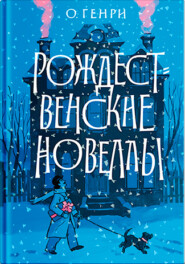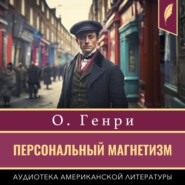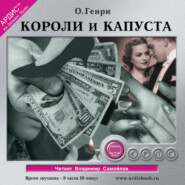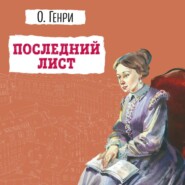По всем вопросам обращайтесь на: info@litportal.ru
(©) 2003-2024.
✖
Heart of the West
Настройки чтения
Размер шрифта
Высота строк
Поля
With his courtliest smile upon his heavy but classic features, Judge Menefee advanced, and took the apple, as if to examine it, from the hand of Dunwoody. In his hand it became Exhibit A.
"A fine apple," he said, approvingly. "Really, my dear Mr. Dudwindy, you have eclipsed all of us as a forager. But I have an idea. This apple shall become an emblem, a token, a symbol, a prize bestowed by the mind and heart of beauty upon the most deserving."
The audience, except one, applauded. "Good on the stump, ain't he?" commented the passenger who was nobody in particular to the young man who had an Agency.
The unresponsive one was the windmill man. He saw himself reduced to the ranks. Never would the thought have occurred to him to declare his apple an emblem. He had intended, after it had been divided and eaten, to create diversion by sticking the seeds against his forehead and naming them for young ladies of his acquaintance. One he was going to name Mrs. McFarland. The seed that fell off first would be-but 'twas too late now.
"The apple," continued Judge Menefee, charging his jury, "in modern days occupies, though undeservedly, a lowly place in our esteem. Indeed, it is so constantly associated with the culinary and the commercial that it is hardly to be classed among the polite fruits. But in ancient times this was not so. Biblical, historical, and mythological lore abounds with evidences that the apple was the aristocrat of fruits. We still say 'the apple of the eye' when we wish to describe something superlatively precious. We find in Proverbs the comparison to 'apples of silver.' No other product of tree or vine has been so utilised in figurative speech. Who has not heard of and longed for the 'apples of the Hesperides'? I need not call your attention to the most tremendous and significant instance of the apple's ancient prestige when its consumption by our first parents occasioned the fall of man from his state of goodness and perfection."
"Apples like them," said the windmill man, lingering with the objective article, "are worth $3.50 a barrel in the Chicago market."
"Now, what I have to propose," said Judge Menefee, conceding an indulgent smile to his interrupter, "is this: We must remain here, perforce, until morning. We have wood in plenty to keep us warm. Our next need is to entertain ourselves as best we can, in order that the time shall not pass too slowly. I propose that we place this apple in the hands of Miss Garland. It is no longer a fruit, but, as I said, a prize, in award, representing a great human idea. Miss Garland, herself, shall cease to be an individual-but only temporarily, I am happy to add" – (a low bow, full of the old-time grace). "She shall represent her sex; she shall be the embodiment, the epitome of womankind-the heart and brain, I may say, of God's masterpiece of creation. In this guise she shall judge and decide the question which follows:
"But a few minutes ago our friend, Mr. Rose, favoured us with an entertaining but fragmentary sketch of the romance in the life of the former professor of this habitation. The few facts that we have learned seem to me to open up a fascinating field for conjecture, for the study of human hearts, for the exercise of the imagination-in short, for story-telling. Let us make use of the opportunity. Let each one of us relate his own version of the story of Redruth, the hermit, and his lady-love, beginning where Mr. Rose's narrative ends-at the parting of the lovers at the gate. This much should be assumed and conceded-that the young lady was not necessarily to blame for Redruth's becoming a crazed and world-hating hermit. When we have done, Miss Garland shall render the JUDGEMENT OF WOMAN. As the Spirit of her Sex she shall decide which version of the story best and most truly depicts human and love interest, and most faithfully estimates the character and acts of Redruth's betrothed according to the feminine view. The apple shall be bestowed upon him who is awarded the decision. If you are all agreed, we shall be pleased to hear the first story from Mr. Dinwiddie."
The last sentence captured the windmill man. He was not one to linger in the dumps.
"That's a first-rate scheme, Judge," he said, heartily. "Be a regular short-story vaudeville, won't it? I used to be correspondent for a paper in Springfield, and when there wasn't any news I faked it. Guess I can do my turn all right."
"I think the idea is charming," said the lady passenger, brightly. "It will be almost like a game."
Judge Menefee stepped forward and placed the apple in her hand impressively.
"In olden days," he said, orotundly, "Paris awarded the golden apple to the most beautiful."
"I was at the Exposition," remarked the windmill man, now cheerful again, "but I never heard of it. And I was on the Midway, too, all the time I wasn't at the machinery exhibit."
"But now," continued the Judge, "the fruit shall translate to us the mystery and wisdom of the feminine heart. Take the apple, Miss Garland. Hear our modest tales of romance, and then award the prize as you may deem it just."
The lady passenger smiled sweetly. The apple lay in her lap beneath her robes and wraps. She reclined against her protecting bulwark, brightly and cosily at ease. But for the voices and the wind one might have listened hopefully to hear her purr. Someone cast fresh logs upon the fire. Judge Menefee nodded suavely. "Will you oblige us with the initial story?" he asked.
The windmill man sat as sits a Turk, with his hat well back on his head on account of the draughts.
"Well," he began, without any embarrassment, "this is about the way I size up the difficulty: Of course Redruth was jostled a good deal by this duck who had money to play ball with who tried to cut him out of his girl. So he goes around, naturally, and asks her if the game is still square. Well, nobody wants a guy cutting in with buggies and gold bonds when he's got an option on a girl. Well, he goes around to see her. Well, maybe he's hot, and talks like the proprietor, and forgets that an engagement ain't always a lead-pipe cinch. Well, I guess that makes Alice warm under the lacy yoke. Well, she answers back sharp. Well, he-"
"Say!" interrupted the passenger who was nobody in particular, "if you could put up a windmill on every one of them 'wells' you're using, you'd be able to retire from business, wouldn't you?"
The windmill man grinned good-naturedly.
"Oh, I ain't no /Guy de Mopassong/," he said, cheerfully. "I'm giving it to you in straight American. Well, she says something like this: 'Mr. Gold Bonds is only a friend,' says she; 'but he takes me riding and buys me theatre tickets, and that's what you never do. Ain't I to never have any pleasure in life while I can?' 'Pass this chatfield- chatfield thing along,' says Redruth; – 'hand out the mitt to the Willie with creases in it or you don't put your slippers under my wardrobe.'
"Now that kind of train orders don't go with a girl that's got any spirit. I bet that girl loved her honey all the time. Maybe she only wanted, as girls do, to work the good thing for a little fun and caramels before she settled down to patch George's other pair, and be a good wife. But he is glued to the high horse, and won't come down. Well, she hands him back the ring, proper enough; and George goes away and hits the booze. Yep. That's what done it. I bet that girl fired the cornucopia with the fancy vest two days after her steady left. George boards a freight and checks his bag of crackers for parts unknown. He sticks to Old Booze for a number of years; and then the aniline and aquafortis gets the decision. 'Me for the hermit's hut,' says George, 'and the long whiskers, and the buried can of money that isn't there.'
"But that Alice, in my mind, was on the level. She never married, but took up typewriting as soon as the wrinkles began to show, and kept a cat that came when you said 'weeny-weeny-weeny!' I got too much faith in good women to believe they throw down the fellow they're stuck on every time for the dough." The windmill man ceased.
"I think," said the lady passenger, slightly moving upon her lowly throne, "that that is a char-"
"Oh, Miss Garland!" interposed Judge Menefee, with uplifted hand, "I beg of you, no comments! It would not be fair to the other contestants. Mr. – er-will you take the next turn?" The Judge addressed the young man who had the Agency.
"My version of the romance," began the young man, diffidently clasping his hands, "would be this: They did not quarrel when they parted. Mr. Redruth bade her good-by and went out into the world to seek his fortune. He knew his love would remain true to him. He scorned the thought that his rival could make an impression upon a heart so fond and faithful. I would say that Mr. Redruth went out to the Rocky Mountains in Wyoming to seek for gold. One day a crew of pirates landed and captured him while at work, and-"
"Hey! what's that?" sharply called the passenger who was nobody in particular-"a crew of pirates landed in the Rocky Mountains! Will you tell us how they sailed-"
"Landed from a train," said the narrator, quietly and not without some readiness. "They kept him prisoner in a cave for months, and then they took him hundreds of miles away to the forests of Alaska. There a beautiful Indian girl fell in love with him, but he remained true to Alice. After another year of wandering in the woods, he set out with the diamonds-"
"What diamonds?" asked the unimportant passenger, almost with acerbity.
"The ones the saddlemaker showed him in the Peruvian temple," said the other, somewhat obscurely. "When he reached home, Alice's mother led him, weeping, to a green mound under a willow tree. 'Her heart was broken when you left,' said her mother. 'And what of my rival-of Chester McIntosh?' asked Mr. Redruth, as he knelt sadly by Alice's grave. 'When he found out,' she answered, 'that her heart was yours, he pined away day by day until, at length, he started a furniture store in Grand Rapids. We heard lately that he was bitten to death by an infuriated moose near South Bend, Ind., where he had gone to try to forget scenes of civilisation.' With which, Mr. Redruth forsook the face of mankind and became a hermit, as we have seen.
"My story," concluded the young man with an Agency, "may lack the literary quality; but what I wanted it to show is that the young lady remained true. She cared nothing for wealth in comparison with true affection. I admire and believe in the fair sex too much to think otherwise."
The narrator ceased, with a sidelong glance at the corner where reclined the lady passenger.
Bildad Rose was next invited by Judge Menefee to contribute his story in the contest for the apple of judgment. The stage-driver's essay was brief.
"I'm not one of them lobo wolves," he said, "who are always blaming on women the calamities of life. My testimony in regards to the fiction story you ask for, Judge, will be about as follows: What ailed Redruth was pure laziness. If he had up and slugged this Percival De Lacey that tried to give him the outside of the road, and had kept Alice in the grape-vine swing with the blind-bridle on, all would have been well. The woman you want is sure worth taking pains for.
"'Send for me if you want me again,' says Redruth, and hoists his Stetson, and walks off. He'd have called it pride, but the nixycomlogical name for it is laziness. No woman don't like to run after a man. 'Let him come back, hisself,' says the girl; and I'll be bound she tells the boy with the pay ore to trot; and then spends her time watching out the window for the man with the empty pocket-book and the tickly moustache.
"I reckon Redruth waits about nine year expecting her to send him a note by a nigger asking him to forgive her. But she don't. 'This game won't work,' says Redruth; 'then so won't I.' And he goes in the hermit business and raises whiskers. Yes; laziness and whiskers was what done the trick. They travel together. You ever hear of a man with long whiskers and hair striking a bonanza? No. Look at the Duke of Marlborough and this Standard Oil snoozer. Have they got 'em?
"Now, this Alice didn't never marry, I'll bet a hoss. If Redruth had married somebody else she might have done so, too. But he never turns up. She has these here things they call fond memories, and maybe a lock of hair and a corset steel that he broke, treasured up. Them sort of articles is as good as a husband to some women. I'd say she played out a lone hand. I don't blame no woman for old man Redruth's abandonment of barber shops and clean shirts."
Next in order came the passenger who was nobody in particular. Nameless to us, he travels the road from Paradise to Sunrise City.
But him you shall see, if the firelight be not too dim, as he responds to the Judge's call.
A lean form, in rusty-brown clothing, sitting like a frog, his arms wrapped about his legs, his chin resting upon his knees. Smooth, oakum-coloured hair; long nose; mouth like a satyr's, with upturned, tobacco-stained corners. An eye like a fish's; a red necktie with a horseshoe pin. He began with a rasping chuckle that gradually formed itself into words.
"Everybody wrong so far. What! a romance without any orange blossoms! Ho, ho! My money on the lad with the butterfly tie and the certified checks in his trouserings.
"Take 'em as they parted at the gate? All right. 'You never loved me,' says Redruth, wildly, 'or you wouldn't speak to a man who can buy you the ice-cream.' 'I hate him,' says she. 'I loathe his side-bar buggy; I despise the elegant cream bonbons he sends me in gilt boxes covered with real lace; I feel that I could stab him to the heart when he presents me with a solid medallion locket with turquoises and pearls running in a vine around the border. Away with him! 'Tis only you I love.' 'Back to the cosey corner!' says Redruth. 'Was I bound and lettered in East Aurora? Get platonic, if you please. No jack-pots for mine. Go and hate your friend some more. For me the Nickerson girl on Avenue B, and gum, and a trolley ride.'
"Around that night comes John W. Croesus. 'What! tears?' says he, arranging his pearl pin. 'You have driven my lover away,' says little Alice, sobbing: 'I hate the sight of you.' 'Marry me, then,' says John W., lighting a Henry Clay. 'What!' she cries indignantly, 'marry you! Never,' she says, 'until this blows over, and I can do some shopping, and you see about the licence. There's a telephone next door if you want to call up the county clerk.'"
The narrator paused to give vent to his cynical chuckle.
"Did they marry?" he continued. "Did the duck swallow the June-bug? And then I take up the case of Old Boy Redruth. There's where you are all wrong again, according to my theory. What turned him into a hermit? One says laziness; one says remorse; one says booze. I say women did it. How old is the old man now?" asked the speaker, turning to Bildad Rose.
"I should say about sixty-five."
"All right. He conducted his hermit shop here for twenty years. Say he was twenty-five when he took off his hat at the gate. That leaves twenty years for him to account for, or else be docked. Where did he spend that ten and two fives? I'll give you my idea. Up for bigamy. Say there was the fat blonde in Saint Jo, and the panatela brunette at Skillet Ridge, and the gold tooth down in the Kaw valley. Redruth gets his cases mixed, and they send him up the road. He gets out after they are through with him, and says: 'Any line for me except the crinoline. The hermit trade is not overdone, and the stenographers never apply to 'em for work. The jolly hermit's life for me. No more long hairs in the comb or dill pickles lying around in the cigar tray.' You tell me they pinched old Redruth for the noodle villa just because he said he was King Solomon? Figs! He /was/ Solomon. That's all of mine. I guess it don't call for any apples. Enclosed find stamps. It don't sound much like a prize winner."
Respecting the stricture laid by Judge Menefee against comments upon the stories, all were silent when the passenger who was nobody in particular had concluded. And then the ingenious originator of the contest cleared his throat to begin the ultimate entry for the prize. Though seated with small comfort upon the floor, you might search in vain for any abatement of dignity in Judge Menefee. The now diminishing firelight played softly upon his face, as clearly chiselled as a Roman emperor's on some old coin, and upon the thick waves of his honourable grey hair.
"A woman's heart!" he began, in even but thrilling tones-"who can hope to fathom it? The ways and desires of men are various. I think that the hearts of all women beat with the same rhythm, and to the same old tune of love. Love, to a woman, means sacrifice. If she be worthy of the name, no gold or rank will outweigh with her a genuine devotion.
"Gentlemen of the-er-I should say, my friends, the case of Redruth /versus/ love and affection has been called. Yet, who is on trial? Not Redruth, for he has been punished. Not those immortal passions that clothe our lives with the joy of the angels. Then who? Each man of us here to-night stands at the bar to answer if chivalry or darkness inhabits his bosom. To judge us sits womankind in the form of one of its fairest flowers. In her hand she holds the prize, intrinsically insignificant, but worthy of our noblest efforts to win as a guerdon of approval from so worthy a representative of feminine judgment and taste.

















